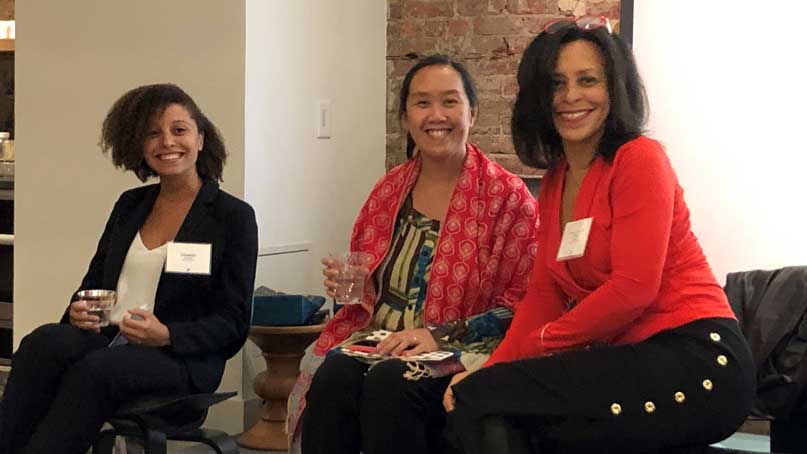I love my flexible consulting work and don’t plan on changing careers any time soon. That said, there are advantages to a traditional, full-time job, such as easier mortgage approval, subsidized healthcare and the camaraderie of an ongoing community.
Now that we have moved to Florida, a traditional job would help us integrate. Healthcare off the Florida state exchange is cheaper than in New York, but health insurance is still a wild card, and health insurance through a job could be an alternative to running off to Costa Rica. Being on the ground in Florida gives us ample time to scout for real estate deals, and with interest rates still low and a possible recession where prices could dip, the prospect of easier access to mortgages is very appealing.

I recently spoke on career mobility for mid- to late-career female professionals. A lot of the questions revolved around the freelance to full-time transition. Some attendees didn’t choose to freelance but fell into it when a longer than expected job search forced them to rely on gigs for the money. Some attendees thought they wanted to freelance – even tried the digital nomad life, or luxury digital nomad life – but realized they preferred a traditional job.
In my previous post on coming back to work after a travel sabbatical (or prolonged job search or other employment gap), one critical factor to landing a job after time away is telling a compelling story about why you are back. This is even more important when you explain your change of heart from freelance to full-time. Do you really want a full-time job or is freelancing just too hard? Employers will be suspicious and may assume the worst.
Determine if you even need to label your time as a freelancer or digital nomad

You may be able to avoid opening this can of worms altogether, depending on how long you have been away. If it is less than a year (ideally less than six months) you could just frame your time off as time off. Focus on the travel aspect, as opposed to testing out the digital nomad life. Talk about your gigs as ad hoc projects and not your attempts to start a business. This way, you continue the story of being a traditional career person, and your time away is an anomaly.
Another possibility is that the person interviewing you doesn’t care about your time away, and therefore you don’t need to bring it up. If your interviewer has also had some employment gaps or has gone from entrepreneur to employee or has traveled extensively, they may not even ask about your time away. Or they may assume it’s for as good a reason as they had. Take their lead, and let them assume the best.
If you are asked about your transition, share the information in its best possible light
Talk excitedly about what you did accomplish, and highlight how your work would specifically translate to this employer. Then, continue to talk excitedly about the opening at hand. No need to dwell on the past or what factored into your decision to move on.
If you are asked point blank about why you want to make the switch, focus on the positives attracting you to your next move, not the negatives discouraging you from the past. For example, you can mention how much you miss the camaraderie of colleagues, how you want the chance to make a bigger impact than you can do as a solo freelancer, or how the continuity of serving one company and one mission allows you stay focused and contribute on a deeper level. All the while you are assuring the company that you’re 100% focused on their priorities, not yours.
Get to the decision-maker before your resume does

The above two strategies only work if you can actually have a conversation with someone and tell your side of the story. In the meantime, your resume or LinkedIn profile shows a gap or that you were most recently a freelancer. When you have a possible red flag (and a job different than what you are going for now is a red flag) your resume and LinkedIn profile work against you. They are flat documents that rely on the reader to interpret what you mean.
Instead of blindly submitting your resume to job postings, spend your time networking to get referrals and introductions to key decision-makers. Get in front of as many people as possible directly so you can tell your story in the best possible light. Red flags make you a non-traditional candidate, and this requires non-traditional search tactics.
Many people transition from freelance to full-time very successfully
John Lim spent a year on project work as a digital nomad and then started a traditional company (and paid off thousands of dollars in student loans during this time). In the early 2000’s, I spent over two years freelancing when I wanted to get back into the arts (I was a music major in college), and then I ended up back in a traditional job when one of my clients hired me in-house. Going from freelance to full-time by being hired by a client is a win-win arrangement – the company gets to see your work firsthand, and you confirm that you really do want to settle down and in that particular work environment.
======
There is probably a success story for the specific transition you are trying to make. Look for the wins, and you’ll start seeing them more easily. Then you can more easily believe it’s possible for yourself.
Let us know where you end up!


 We are Scott and Caroline, 50-somethings who spent the first 20+ years of our adult lives in New York City, working traditional careers and raising 2 kids. We left full-time work in our mid-40’s for location-independent, part-time consulting projects and real estate investing, in order to create a more flexible and travel-centric lifestyle.
We are Scott and Caroline, 50-somethings who spent the first 20+ years of our adult lives in New York City, working traditional careers and raising 2 kids. We left full-time work in our mid-40’s for location-independent, part-time consulting projects and real estate investing, in order to create a more flexible and travel-centric lifestyle.  Financial independence and early retirement is not something we originally focused on, but over time realized it was possible. Our free report,
Financial independence and early retirement is not something we originally focused on, but over time realized it was possible. Our free report, 








Back when I was a manager I interviewed a former freelancer and ultimately hire them. My manager was very down on hiring someone who worked as a consultant thinking they’d never stick around. But me as a hiring manager saw someone who presented as an expert in their field bringing years of experience. That employee is still around years later and I gather one of the standouts on my former team. It’s all in how you present yourself.
Thank you SO much for sharing your real-world comment. I have seen the same thing time and again as a recruiter — some hiring managers are suspicious of freelancers. To your point, one of the concerns is that they’ll leave. I’ve heard frequently the suspicion that they’re only coming back to traditional work b/c they couldn’t make it as a freelancer — i.e., they’re really not that good. It’s a shame b/c the freelance population has a lot of talent, and it would be so much better if people could freely move back and forth between freelance and traditional as opportunities made sense.